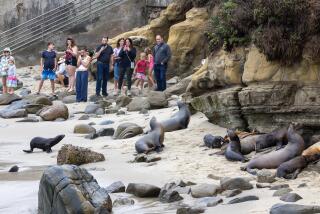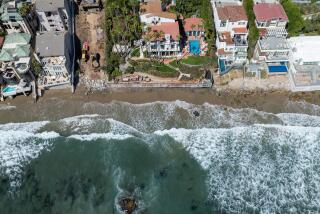Beach Ban Incites Pooch Power Drive
- Share via
They consider themselves fugitives.
Under cover of darkness in the early morning or late evening, they load up their cars and venture out to secret spots, always keeping an eye out for authorities.
But many say the illicit pleasure of watching their beloved dogs romp near the water on public beaches is worth the risk of tickets and heavy fines.
It has been four long years since Los Angeles police stopped looking the other way and began to enforce a ban on dogs on beaches, from Venice to Dockweiler. Because all other Los Angeles County municipalities were already strictly enforcing the county’s 1969 prohibition, dogs and their owners had no nearby beach on which to play legally except for a tiny area on the Ventura County line.
Now, however, a determined group of dog owners say they don’t want to be fugitives anymore. They are launching a political campaign to “take back” the sand, starting with demands that the city of Los Angeles create a large off-leash area for dogs on at least one beach.
But the response of some local politicians, law enforcement officials and environmentalists has been downright catty. They say that canines on the beach pose health and safety hazards from waste and bites, and that most people would prefer that Rover stay home.
Those concerns can be overcome, say the dog lovers, who are tired of facing fines that can be as high as $500 for repeat offenders in such places as Manhattan Beach.
“It’s not like we’re these fanatics and we don’t have anything better to do,” said Daryl Barnett, who co-founded Venice’s vocal dog lobbying group, Freeplay, which last week attracted about 80 people to a rally and fund-raiser.
“They put dog owners in the same category on the beaches as alcoholics and indigents, but we can be trusted and we can be responsible.”
Huntington Beach in Orange County has a strip of sand where leashed dogs are allowed (and where off-leash canines are frequently seen), as do a few San Diego and Ventura County beaches.
Some Successes, but Not at Beaches
Pointing to those peaceful successes, Freeplay proposes that a section of Dockweiler Beach, a relatively unused expanse of sand next to a sewage treatment plant and under the flight path of planes taking off from Los Angeles International Airport, be set aside as the first of what they hope will be several dog beach parks.
With increasing success, dog lovers have been pushing for the creation of non-beach dog parks throughout Los Angeles. But despite rallies, political marches and lobbying, they have not conquered the beaches.
“There’s always a conflict between people who want complete freedom for dogs and people who want public places to be for people,” said Nikki Tennant, spokeswoman for Councilwoman Ruth Galanter, who helped Freeplay secure a non-beach dog park in Venice. Tennant said any effort to create a dog beach would be “a sticky issue.”
Los Angeles Police Senior Lead Officer Brent Honore, who led the Pacific Division’s crackdown on dogs on Venice, Playa del Rey and Dockweiler beaches in 1996, said he believes the majority of beachgoers don’t want dogs there.
“We received so many complaints and threats to be sued and attended so many community meetings about dogs that it just got to the point where we had to take a more proactive approach,” said Honore.
Dogs were chasing joggers, fighting with each other and biting people, Honore said. Many parents complained that their children encountered dog feces or sand soaked with urine as they played by the waves.
Honore said that at first he tried to avoid fining scofflaws, but he eventually realized that dog owners were determined to flout the laws unless they faced severe penalties.
“In general, I’d have to say we are opposed to dog beaches,” said Mitzy Taggart, staff scientist at the environmental organization Heal the Bay. Dog fecal matter can contaminate water, she said, and its presence in the water can throw off tests and makes it difficult for scientists to discern whether there has been a sewage leak that poses a more serious public health threat.
But Taggart said her organization might be able to live with dogs on the beach if owners proved that they could clean up after their dogs.
Organized dog owners dismiss many of those complaints as the prejudice of the uninformed, and pledge that, if given a beach, they will keep their dogs under control and deposit their dog’s waste in garbage cans.
Freeplay is gearing up for next spring’s elections, when they promise to make dog access a major issue in the Los Angeles mayoral and City Council races. The group claims to have gathered 3,000 signatures on a petition for dog parks, and Barnett said it took in $5,000 at the recent fund-raiser.
‘It’s Illegal, but I Do It’
At least one mayoral candidate, City Councilman Joel Wachs, is listening.
“I think the proposal to create an off-leash dog beach at a remote area such as Dockweiler deserves a fair and objective examination, and I support a study of the proposal, including an analysis of the health and safety factors,” Wachs said in a statement.
Meanwhile, dog lovers continue to defy the ban, seeking out unpatrolled beaches and sometimes running from the law.
“We are fugitives from the law. It’s illegal, but I do it,” said Venice dog owner Cathryn Reuther, who has a greyhound. “There’s nowhere else he can run, and he is at his happiest when I take him to the beach.”
Sometimes, Reuther said, she drives Blitz up to Leo Carrillo State Beach, on the Ventura County line. Leashed dogs are permitted on some portions of that beach area operated by the state.
Leo Carrillo is far away, however, and so Reuther, like many dog owners across Los Angeles County, has sleuthed out beaches where she and her dog are unlikely to be caught.
And then there are those dogged rebels who, early in the morning or late at night, take their dogs to the county’s most populated and well-patrolled beaches, such as Venice and Santa Monica.
“How dashing, to be part of an underground,” said Chris Plourde, a Venice resident who has long seethed at the ban on dogs on the beach and confesses that he goes “swimming with the girls,” two mixed-breeds named Sam and Tikhon, at odd hours near his house.
Lifeguards don’t have the power to give tickets, but they can summon police officers to enforce the dog ban. Still, lifeguards say they’ve heard every imaginable excuse.
The standard favorite is the plea that the dog owner was unaware of the ban despite posted signs.
Lifeguard Danny Douglas said one man once looked into a lifeguard’s eyes and said, “He’s not a dog. He’s part of my family.” Others have contended that they did not believe that leash laws pertained to local residents. Honore said those pleas will not deter officers from giving tickets, even at 6 a.m.
“The bottom line is the beaches have never belonged to dogs. The beaches belong to people,” he said.
Knowing authorities feel that way, many dog owners prefer to flee.
Dog activist Penny Fitzgerald said police once chased her more than a half a mile down Venice Beach. She hid under the pier until high tide, then escaped.
“There’s people smoking crack and dealing drugs, but they’ll ignore them and go after you,” she said. “Everyone who has a dog has a horror story like that,” she said. “That’s why this is such a pressing issue.”
More to Read
Sign up for Essential California
The most important California stories and recommendations in your inbox every morning.
You may occasionally receive promotional content from the Los Angeles Times.













